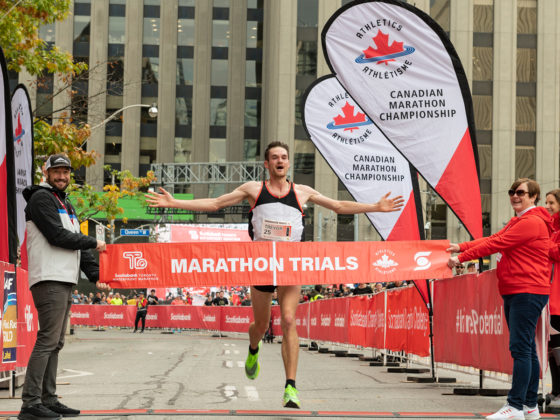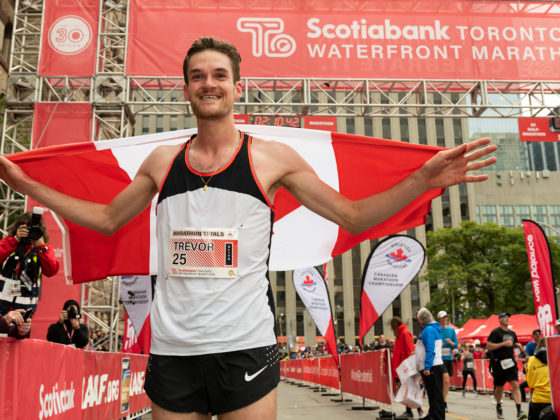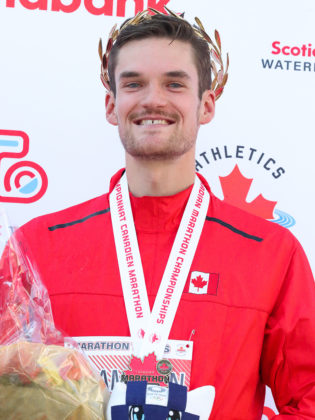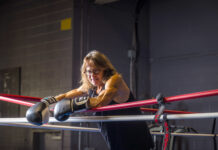UPDATE MARCH 30, 2020:
Since our annual Running Issue came out at the beginning of March, the world as we know it has changed due to the COVID-19 Pandemic – including the postponement of the 2020 Tokyo Summer Olympic Games to 2021.
IMPACT Publisher, Elaine Kupser checked in with 2020 Summer Olympian – our cover athlete, Trevor Haufbauer to see how he was doing amidst the whirlwind of change.
Elaine: Although you may have been preparing for the inevitable news, how were you feeling during the time leading up to this and how did you ultimately feel once it was confirmed that the 2020 Summer Olympics were postponed?
Trevor: “I am feeling a mix of emotions right now regarding the postponement of the Olympics. I am happy that they were pushed back a year because we all have a responsibility to minimize the impact of the COVID-19 virus and the health of others should be top priority right now. I am upset though because I have trained and dreamed of being in this moment for the past five years. Looking at the bright side of the situation, a year delayed is better than never happening, so I’m focused on the future.”
Elaine: Has this had a serious emotional/psychological effect on you?
Trevor: “It has had an emotional effect on me, for sure. The world changed in the blink of an eye and the stress caused me to break. The Olympics isn’t just an event for me, it’s my profession and career. The postponement has much more implications on my life than just running another race.”
Elaine: What are your current plans?
Trevor: “My current plans are up in the air. I don’t know how many more races are going to be postponed or cancelled so I have nothing written in stone.”
Elaine: How and will you ease back into the training schedule for 2021?
Trevor: “For the remainder of 2020, I’ll stay reasonably fit so I can be the best version of myself in 2021. In additional, I’ll spend a lot of time on my biomechanics and focus on strengthening my body through a detailed weight program.”
Elaine: Do you have a statement to the public?
Trevor: “Be responsible and keep your distance =).”
We wish Trevor and all of our Olympians the best of health over the upcoming months, and we will be behind you all leading up to the Games in 2021.
Original March/April 2020 Cover Story Below

Trevor Hofbauer sits in the corner of the Purple Perk coffee shop in southwest Calgary. He’s tall and thin, like you’d expect a distance runner to be. He looks younger than his 28 years and he’s quiet, yet charming. He has an air of subtle assurance about him that underscores an iron will and competitive drive.
Last fall, at the Scotiabank Toronto Waterfront Marathon, Hofbauer became the second man in Canadian history to run a marathon under 2:10. His time of 2:09:51 automatically qualified him for the marathon event at the 2020 Tokyo Olympics.
But the bigger news was that Hofbauer beat his own PB marathon time of 2:16:48 by nearly seven minutes, a result no one anticipated but Hofbauer himself. He wasn’t expected to qualify at the race, and even his major sponsor pulled out a couple of weeks ahead, wanting to put their dollars behind more of a sure bet.
The lack of external pressure gave Hofbauer space to prepare mentally and do his own thing before the race. He says he didn’t stress about the race and doesn’t get nervous before he runs either.
“My partner Courtney Brohart and I had just bought a 1984 Westfalia camper van,” he explains, “and in the week leading up to Toronto I spent three days working on the flooring. Then, my family came to Toronto and we just hung out and kept it normal.”
That seems to be Hofbauer’s approach to both training and life – don’t get rattled, stay focussed on the task at hand and take things one day at a time.
“I have not had many performances to indicate a 2:09 is what I am capable of because the opportunities to showcase my abilities didn’t pan out,” Hofbauer says.
In the years leading up to the Toronto Marathon, Hofbauer was plagued with illness and injury that hampered his long-term plan to qualify for the Olympics. In 2018, he sprained his ankle in Kenya which impacted his time in the NYC Half Marathon. Then, illness forced him to withdraw from the Prague Marathon where he had hoped to decrease his 2:18 time to 2:16.
“In 2019, I battled some illness and couldn’t get a consistent build together. I still ran 2:16 in Hamburg but the goal was for 2:13. From that point, 2:09 doesn’t look like as big of a jump anymore.”
Running wasn’t always a passion with Hofbauer. As a kid, he played competitive basketball but by the end of high school had lost interest in the sport. He joined the track and field teams at school purely for cross-training and although he says he ‘felt like a hamster’ running around the track, it was clear he had talent.
“I’d place in the top three at the city meets without even really training or trying hard so I knew I had some potential,” he says.
After high school graduation in Calgary, Hofbauer headed off to the Southern Alberta Institute of Technology (SAIT) and decided to join the cross country team, just to stay active.
“My first season sucked,” he laughs. “I had shin splints and was only able to compete in one race – the National Cross Country Championships.”
He placed 76th but didn’t give up and the next year, he moved up to 25th place showing remarkable improvement. At SAIT he worked with coach Jamie Grant who gave him a blueprint for training and introduced him to Daniels’ Running Formula, a book by coach Jack Daniels, that he still uses.
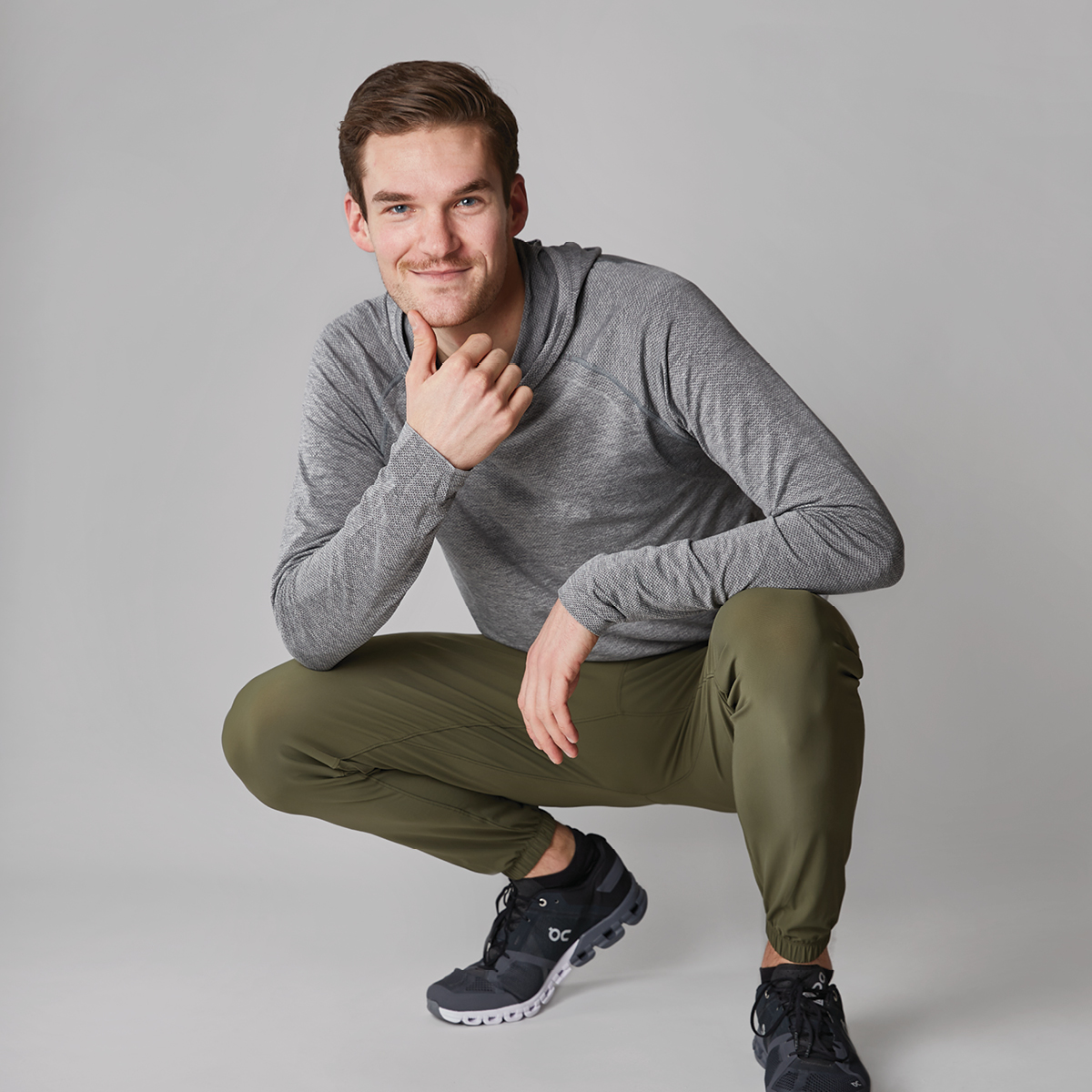
“I don’t follow the book exactly, I tweak the workouts,” Hofbauer explains.
After graduating from SAIT in 2013 Hofbauer continued running, doing a
half-marathon in Vancouver for fun and finding out he really enjoyed it. Similar races followed and Hofbauer began improving his results, training as much as he could while working full time.
“I don’t really train like most marathoners, getting in a lot of distance. I go moderately hard for three days a week, then very hard for two days a week. I alternate these workouts week to week. I don’t have a lot of easy runs during a training block and my volume isn’t that high.”
Another thing that’s different about Hofbauer is that he doesn’t have a coach. Instead, he’s educated himself by reading books on running theories and nutrition. He bounces ideas off Calgary Spartans running coach Deon Flynn but basically, he does his own thing.
He also runs alone most of the time and that’s his favourite part of the sport.
“Running is like meditating. It’s like having a break from a busy day. There’s often a lot going on and I have a big social network that I’m involved with. So when someone asks to run with me, I usually politely turn them down! I really like my alone time.”
Living in a winter city with darkness lurking long into the mornings and early into the evenings, makes for difficult training some days.
“I expect myself to do my best even on off days,’ says Hofbauer. “My will to succeed triumphs any other feeling.”
Now that he’s qualified for the Olympics, Hofbauer doesn’t need to run another marathon race until Tokyo but he has a few other goals in mind.
“I’m looking at doing the World Championships for the half marathon in Poland in March and I’m trying to get Dayna [Pidhoresky*] to go too. They want us to keep demonstrating good results and this would really set us up for success at the Olympics.”
With the Olympics only a few months away, Hofbauer isn’t likely to be stressing. And he says he won’t even get excited until he’s on the plane to Tokyo. Instead right now he’s probably focused on the next race or the next stage of camperizing his van. For this athlete it’s one day at a time, one goal at a time, one race at a time. And that’s a philosophy we could all live by.
*Dayna Pidhoresky also qualified for the 2020 Tokyo Olympic marathon in Toronto. She was featured on the cover of IMPACT Magazine’s 2019 March/April issue.
Photos by Katy Whitt


